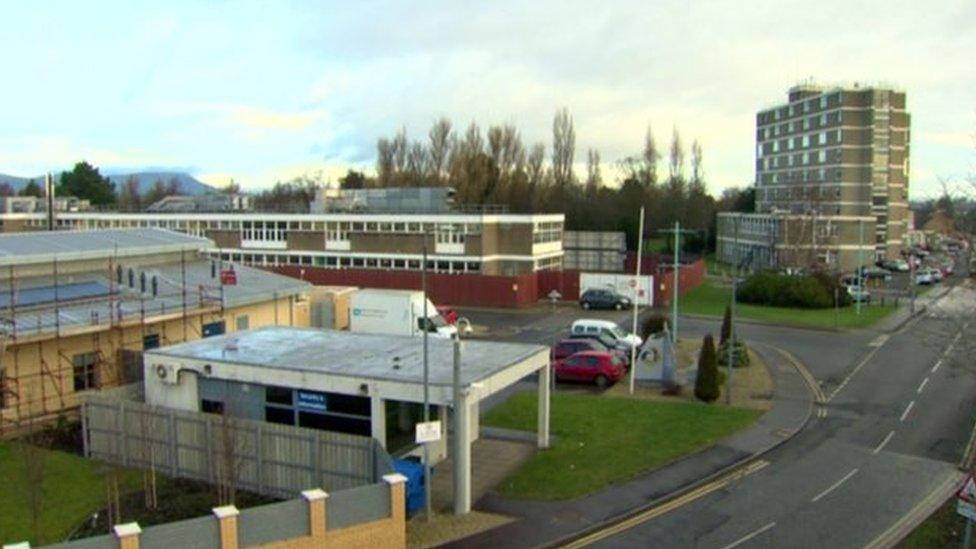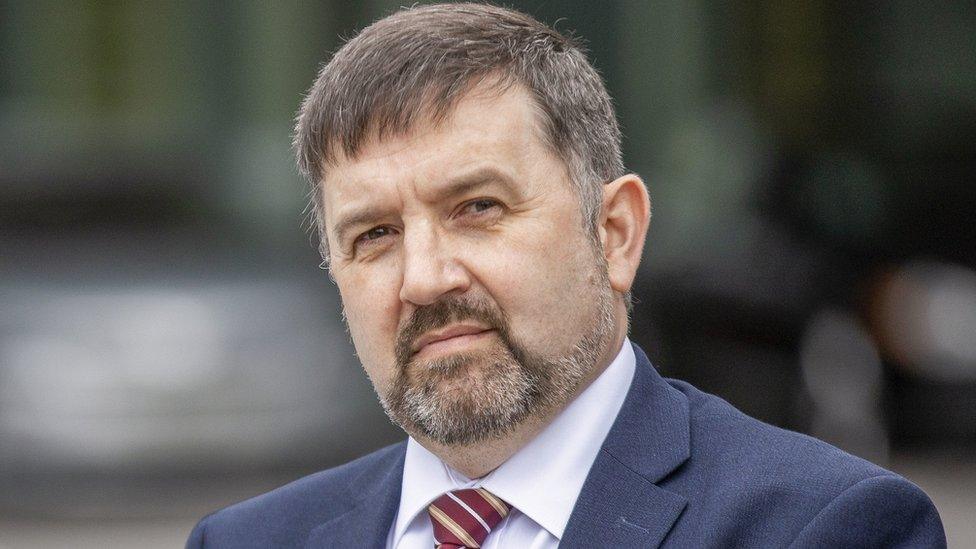Belfast Trust: Hospital target to restore orthopaedic surgery
- Published

Elective orthopaedics has the longest and largest waiting lists in Northern Ireland
The health minister has set a four-month target for orthopaedic surgery at Belfast's Musgrave Park Hospital to be restored to pre-pandemic levels.
Elective orthopaedics has the longest and largest waiting lists in Northern Ireland with 25,526 people waiting for treatment by 31 March 2022.
Robin Swann announced a new recovery board to push forward with the rebuilding of these services.
He also announced elective orthopaedic hubs at three health trusts.
The hubs will be based at Musgrave Park Hospital for the Belfast Trust and in the Southern and Western trusts.
These will include ring-fenced staff and beds.
Rebuilding priorities includes increasing the use of theatres and treatment sessions.
The setting up of the orthopaedic surgery recovery board follows an external clinically-led review into orthopaedic services in Northern Ireland called a Getting It Right First Time (GIRFT) review.
This review is also being used in the NHS in Great Britain.

Musgrave Park Hospital in Belfast has been set a new target by the health minister
Mr Swann said he welcomed the GIRFT review and hoped it will "help turn the page on a difficult and frustrating chapter for orthopaedic surgery".
The GIRFT report said that "given the significant lack of progress in restarting orthopaedic elective surgery in Belfast, Belfast Trust should immediately and prior to any change in the oversight arrangements of Musgrave Park, ringfence the existing staff and beds at Musgrave Park and make a significant restart to orthopaedic elective surgery".
One of the recommendations outlined that there should be "implementation of a six or seven-day service, consisting of three session days and including all support".
It also recommended that the Department of Health (DoH) requests each health trust to provide their elective orthopaedic surgery recovery plans for the next 12 months by the end of July.

Orthopaedic surgeon Gavan McAlinden "welcomed" the move by the health minister
'No quick fix'
Orthopaedic surgeon Gavan McAlinden "welcomed" the move by the health minister believing the target set will be a "benefit to patients".
Mr McAlinden said it was "not a quick fix" but a step in the right direction.
"I can't overstate how big the step is, that the minister has the support for the ring fencing of staff, ring fencing of beds and ring fencing of the likes of orthopaedic surgery".
Prof Mark Taylor from the Royal College of Surgeons also described the announcement as "another step in the right direction".
"The college has been calling for surgical hubs across Northern Ireland, which separate planned surgery and emergency care, since the pandemic began," he explained.
"Today's announcement will allow patients, beds and staff to be protected from other hospital pressures, so that those who need planned hip or knee treatment can receive it."
Meanwhile, the health minister also published an action plan setting out a programme of reform for stroke services.
It follows the public consultation undertaken by the department in 2019, which received more than 19,500 responses.
Decision making on the consultation was delayed by the pandemic.
The action plan includes timescales for improvements in areas like a seven day assessment service for Transient Ischemic Attacks (known as mini-strokes), a 24/7 Thrombectomy service, the rollout of early supported discharge to all trusts and the development of community-based services for stroke survivors.
Mr Swann said: "In terms of hospital services, the consultation also proposed a new network of Hyper Acute Stroke Units (HASUs) and Acute Stroke Units (ASUs) be established.

Robin Swann has also set out a programme to reform stroke services
"This has been the subject of widespread concern, particularly in relation to travel times to HASUs.
"Whilst supportive in principle of the development of Hyper Acute stroke care, I believe more work is needed before decisions on the locations of HASUs and ASUs can be made.
"In particular, the evidence base that underpinned the 2019 consultation needs to be updated and enhanced, including on the implications for stroke care of our ageing population."